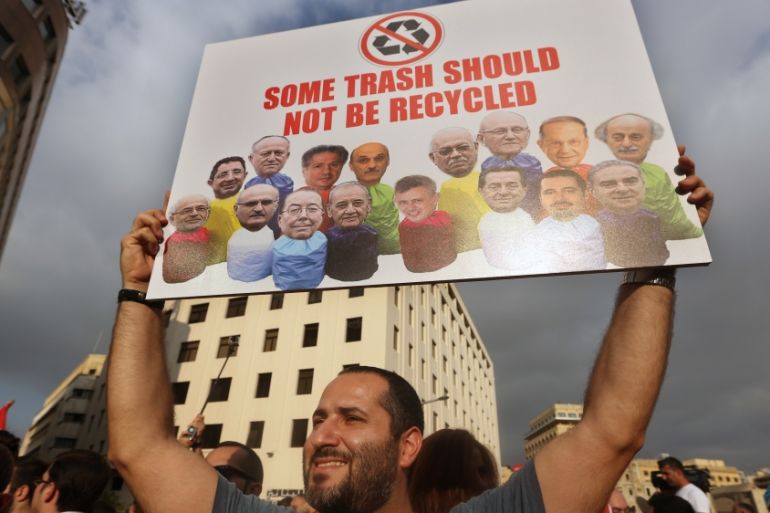Cabinet members storm out of Lebanon trash-crisis talks
Six ministers of the Hezbollah group and its allies exit meeting as no solution is found to rubbish crisis in Beirut.

Six ministers of the Hezbollah group and its allies have walked out of a Lebanese cabinet meeting that had been called to discuss the country’s worsening rubbish collection crisis, reflecting the government’s lingering dysfunction despite mass protests.
Prime Minister Tammam Salam had called for Tuesday’s emergency meeting after a weekend of clashes between security forces and demonstrators protesting against corruption and poor public services, which left one person dead.
The ministers, who withdrew four hours into the meeting, did not give a joint statement for their decision.
Foreign Minister Gibran Bassil, whose Free Patriotic Movement is aligned with Hezbollah, said he was pulling out because of the “theatre” being performed around the rubbish collection issue, without elaborating further.
The crisis has re-emphasised the long-existing fault lines in Lebanon, which in recent years have pitted the Iran-backed Hezbollah movement against the country’s Western-backed, pro-Saudi camp.
Bid rejected
Following the ministers’ walk out, the cabinet unanimously rejected the winning bidders to privately manage Beirut’s rubbish collection, which had been announced by the environment minister on Monday, citing high costs.
A cabinet statement on Tuesday said $100m of development money was being allocated to the northern Akkar region, which has been proposed as a potential landfill site by some politicians.
It tasked a ministerial committee with restarting the bidding process, suggesting there was no imminent solution for the crisis that has sparked the protests.
As the cabinet had gathered, environmental activist Paul Abi Rached told the Reuters news agency: “All our previous movements called [on the government] not to pass the tenders dividing Lebanon into six regions controlled by private companies, instead of having the municipalities processing waste.”
Anger about the heaps of rubbish accumulating in Beirut’s streets boiled over this week with thousands protesting against the government’s failure to deliver basic services.
The clashes turned violent over the weekend, prompting the government to erect a concrete wall outside its main building to prevent protesters from reaching it.
Struggling to contain street anger, authorities began removed the wall on Tuesday, 24 hours after it was erected.
The wall was being taken down on orders from Salam, after demonstrators dubbed it a “wall of shame.”
Lebanon’s multi-sectarian power-sharing government has been without a president for more than a year, and parliament has extended its term twice without elections.